Where to? What Next?
My Syllabus
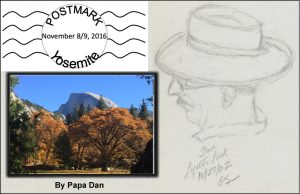
Where to?
Carl Sandburg—
“The people will live on;
The learning and blundering people
will live on.”
“They will be tricked and sold,
and again sold.”
“You can’t laugh off
their capacity to take it.”
— Carl Sandburg
Carl Sandburg
November 8, 2016
As I write this, I am sitting in a chair, surrounded by the spectacular beauty of Yosemite. Looking up from my pen and notebook, the carved granite of Half Dome stands directly in front of me; I can hear the constant roar of Yosemite Falls from my left; and the silent flow of the Merced River drifts downstream ten feet to my right.
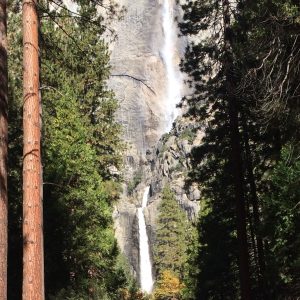
Yosemite Falls
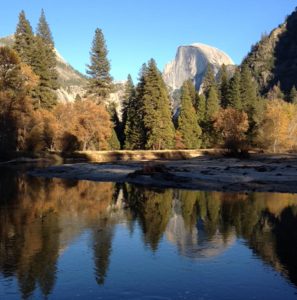
Half Dome
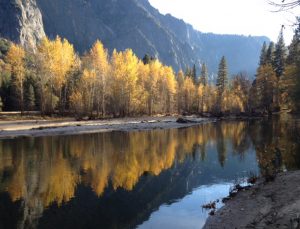
The Merced River
There is a spirit here — a spirit that (or who) inspires big ideas.
Today is a big day. Today is Election Day (outcome yet to be determined); but this piece is not about the election. It is about something much bigger: It is about you and me, you know, America. In the 1830s, Alexis de Tocqueville defined America as “the great experiment in democracy on the North American continent” with grand, historic intentions. And, as I mentioned, America — that is, you and me — is much more than elections; and it is also much more than the good intentions that initiated that great experiment. Henry Ford once famously said, “You don’t build a reputation on what you are going to do” (I read it on my tea bag this morning). We are what we do; and that’s how we must be remembered.
So, what have we done? “We” — that is, America before you and me — built a nation on some important ideas that had been brewing in Europe for quite some time, and “we” applied those ideas in an experiment. “We, the People,” applied them to the lives of some of the people who lived on this continent; allowed lots of people from around the world to come here to participate; and actually welcomed many of them — not all of them, and some more than others. And, while we were doing that, “we” (again, before you and me arrived on the scene) “we” built great things on those big ideas:
- government institutions,
- institutions of justice and law,
- practices in support of banking and commerce,
- transportation systems,
- foundations to encourage the arts and sciences,
- technology to change the world over and over,
- systems to enable a historic level of prosperity,
- traditions for how we treat one another,
- and much more.
Along the way, we fostered an adventurous spirit that expanded the great experiment — America — across the length and breadth of the continent and, by doing all that, we built a reputation that influenced the lives of people around the world.
Yes, that was a lot of doing on which to build a reputation.
Now, granted, the expansion across the continent incorporated/appropriated a lot of land and resources that had for a long time ‘belonged’ to other people; and, granted, the prosperity we created was made available to some of us and not others; and the worldwide influence America wielded resulted in both good and ill; BUT …
Here we stand today — standing on the shoulders of giants (well, OK, some of them were giants and some of us made it to their shoulders). Nevertheless, here we stand, here in the twenty-first century, you and me. We are the heirs of what has been passed down to us and the stewards of all that America IS.
So, now that American IS you and me (yours and mine), what have we done? And what are we doing?
Remember, this is NOT about the election, honest, I promised. Besides, we haven’t actually had the election yet — voting is still in progress cross the land as I scribble these words here beside the river; but we have been doing some things as stewards and owners of America — “We the People,” collectively — that really do define the time in which we live and the variety of experiences that we are all having. Those of us who read and listen have been hearing a lot of the details by which the news media keeps score of how we are doing:
- more people are employed today than were working a year or two ago,
- the average income of Americans has increased gradually in the past year or two,
- the stock market, although fluctuating with the news cycle, is at an all-time high,
- our achievements in science and technology are breathtaking,
- there are more students attending American universities than ever before,
- and much more.
AND, as has always been the case, America and its institutions face more dramatic and difficult challenges than ever before:
- the benefits of American prosperity are shared unevenly, with more wealth at the top and more people at the bottom;
- people less fortunate need more help than ever;
- in spite of historic advancements by people of color throughout our society, more violent incidents of racial animosity are reported in the news almost every day, many of which include deadly encounters between law enforcement and minority citizens.
One observation every American seems to agree with is that “we” are more divided ever.
Technology enables our social interactions to be instantaneously and widely distributed — that’s both the good news and the bad news — allowing us to instantly distribute far and wide the most beautiful and the most vile ideas. We try to use that capability to help us discuss the collective decisions we have to make; and then we have elections — like today.
A famous line, attributed to several of our forebears reminds us that:
“Democracy is that form of government in which the people get the government they deserve.”
As we wait for the results of today’s election, we might well ask, what do we deserve? Whether we like it or not, I suppose we will see the answer to that question in the election returns. Will we all agree that we deserve what we get? Perhaps we will look to those who have gone before us for guidance. We have been warned about what we might deserve.
Thomas Jefferson: “I tremble for my country when I consider that God is just.”
So, do our forebears teach us what to do when we are disappointed? On that subject., one of the most important speeches of our time is remembered by only a few. After losing his challenge of the results of the Florida vote count (he lost by 533 votes) in a decision by the U.S. Supreme Court (on a 5-4 vote), Al Gore reminded us, on December 13, 2000, of the longstanding importance of the peaceful transfer of power:
“Let there be no doubt, while I strongly disagree with the court’s decision, I accept it. It has been resolved as it must be resolved, through the honored institutions of our democracy.”
This week, Al Gore spoke to a ‘get out the vote’ rally: “Every vote counts. Trust me on this.”
So, after listening to the rhetoric over the past few weeks, can we be sure that wisdom passed down to us about the ‘peaceful transfer of power’ will prevail at the end of this day?
So, how’d we do? Tomorrow will tell the story.
November 9, 2016
This morning, we took a walk from Yosemite Lodge across Cook’s Meadow to the bridge on the Merced River. A woman pointed up at a tree, “Look,” she said, “an American eagle!” Sure enough. There he was, perched high in a tree, his large white head turned to one side of his dark torso the way we always see him when he plays his role as the symbol of our nation. Question: was he here to bring a message of encouragement to us up here in the mountains or did he come here to escape what had happened down in ‘the world below?’ OK, silly question — he LIVES up here in the mountains and doesn’t much care what happens down in ‘the world below.’ But for us, the symbolism was strong.
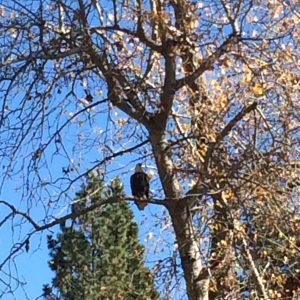
An American Eagle
OK, so we learned what had happened yesterday down in the world below. It was a shock, to say the least. Some were asking, can we survive this? But, as I said, this piece of writing is not about the election. It asks the question – in light of where “we” have been and what we have done to get where we are today, what are we supposed to do now? Regardless of which way the course of human events takes us, what are our responsibilities going forward? Can “We the people” (you know, you and me, America) survive and prosper even when we make big mistakes and when things don’t go the way we had hoped?
Fortunately, there are optimists among our forebears who reach out from their own difficult days to offer hope to us in ours. Carl Sandburg is one of those. Below are words from his poem about what “the people” do in times of crisis.
The People Will Live On — Carl Sandburg, 1936
“The people will live on.
The learning and blundering people will live on.
They will be tricked and sold and again sold
And go back to the nourishing earth for rootholds,
The people so peculiar in renewal and comeback,
You can’t laugh off their capacity to take it.
In the darkness with a great bundle of grief
The people march . . . ‘Where to? What next?’ “
We have begun hearing from people who are concerned about the effects of yesterday’s outcome. A friend of mine, seriously depressed about yesterday’s news, told me in an e-mail that she decided that she must do something. Whining about our disappointment is not enough, she reasoned. She plans to volunteer where she might be needed to help mitigate the effects of what happened yesterday. Another friend told Gretta “I don’t know if I can get over this.” Gretta’s answer: “Maybe we’re not supposed to get over it. Maybe we have to accept it and find something we can do to help. People are going to need help.” Others have suggested that it is time to increase our contributions to organizations that can help those who are going to suffer from the news — immigrants, those who will lose their health care, kids in school programs that will be cut, those who receive necessary assistance from government programs threatened by yesterday’s news, those who had hoped that “we the people” would try to mitigate global warming — you know, you and me: America. There are many choices one can make. As a first step, we have decided to increase some of our contributions. These are some of our favorites: The American Civil Liberties Union, The Natural Resources Defense Council, Planned Parenthood, The Sierra Club, and The Yosemite Conservancy. Many other approaches are available — an organization that supports the homeless? A school district, maybe even one in another town? I suspect that we all have ideas to add to that list.
Yesterday, November 8, 2016, “We, the people” spoke in the form of 290 electoral votes; and today, “we the people” have the opportunity to speak in other ways as well.
Looks like some difficult times ahead for a lot of people.
What must I do to help?
What must you?
Download a PDF of this piece: where_to_what_next_convivio![]()
What must I do to help? What a great question.
For me, the answer is easy and obvious. I am called to pray for our Country and for our leaders. Living in a Blue State, it is very hard to utter these words. I will be seen by many to be a one-off-nut-job. I will be accused of being backward, simple-minded, and fully indoctrinated by the Christian (the Follower-of-Jesus kind) of Church. I will not attempt to defend what I know to be true. But I will say that my Faith has served me well.
I am not afraid. God is sovereign, and it’s not as though HE blinked and everything went sideways. I have heard “What is this world coming to”? all my life. And still we move along smartly. The kids get their education, the house gets paid off, we save enough money to be able to live out the rest of our lives frugally.
Dan, I am just not an alarmist. I refuse to be afraid. I refuse to give away my joy. I don’t let broken and terrified people live in my head rent-free.
Maybe I am simple-minded, but I choose this over a chronic state of anxiety and horror at what MAY happen next. I would rather be dead that live like that.